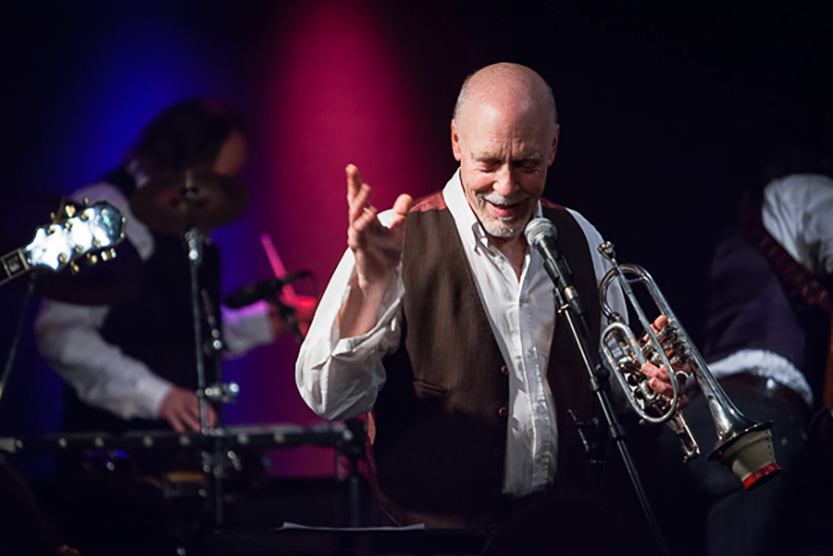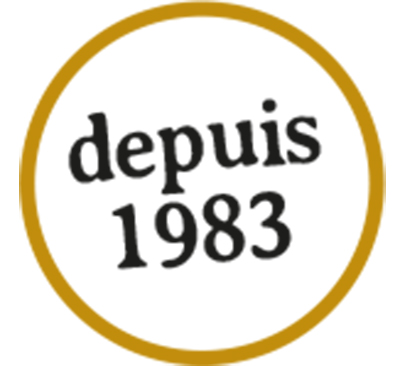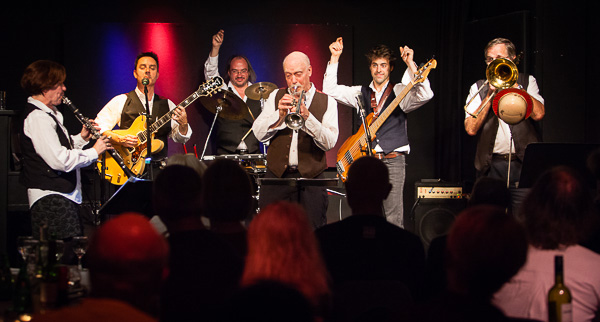Interview With Stanley Lake
Un texte de Hélène de Launière
Paru dans le numéro Été/Summer 2021
Publié le : 15 juin 2021
Dernière mise à jour : 18 juin 2021
For the 20th anniversary of the Ssutton Jazz Ffestival, Hélène de Launière interviewed Stanley Lake at his country house nestled in the bucolic setting of the Appalachians.

A born organizer, but also one who brings his ideas brilliantly to life, Stanley Lake is a one-man orchestra who is, at the same time, a trumpeter, a singer, a composer, a potter, and of course, artistic director of the Sutton Jazz Festival. His talents, tenacity, generosity and dedication are well known to musicians, artists and artisans in the region. I met Stanley Lake at his country house nestled in the bucolic setting of the Appalachians.
Can you tell me about your artistic statement and your cultural involvement in the Sutton region?
I immigrated to Canada in 1974. A year later, I established my pottery studio in Dunkin in an old barn. I have always been interested in promoting the work of artists and artisans. This eventually led to the creation of the Tour des Arts some thirty years ago. The idea was to show the work of artists in their studio and also to attract a new clientele of tourists. Ten years later, in 2001, the same idea evolved into the creation of the Sutton Jazz Festival, to promote local jazz musicians, by providing them with concert venues and by educating the public to the different aspects and styles of jazz.
And your background in music?
I started studying classical music at the age of 9. I first studied piano and then switched to trumpet until I was 18. Funny thing is, I was not a very good student as I never practised. My teacher, Harry Herforth, was second trumpet and assistant principal of the Cleveland Symphony Orchestra. When I was young, I listened to 1950s jazz and went to concerts. While studying at the University of Miami, I was responsible for programming concerts for approximately 15,000 students. A few years after I arrived in Canada, I met Dave Sutherland, an accomplished saxophonist and clarinetist and told him about my interest in playing jazz. Dave became my mentor and introduced me to jazz concepts. I practised more in the first month after meeting Dave than I ever had as a youngster.
What were the beginnings of the festival?
The festival began in 2001 and performances were at the Sutton Art Gallery. For the first three years the festival was held in winter for four or five weekends. Vicky Tansey, singer, dancer, improviser and teacher in Sutton was my partner for a year. Eventually, we were hoping that the funds would be sufficient to pay the musicians as we had no funding at that time other than box-office revenues.
We presented some well-known groups and performers such as: the LML trio which was often invited to the Montreal Jazz Festival with Roberto Murray, and a Klezmer group, Streimel and some local groups. All in all, we had about 15 to 25 people attending the concerts. Tickets were $15. The people were grateful, so we felt there was an audience for jazz in Sutton. After four years of existence, word spread of a new jazz festival in Sutton and musicians and bands were interested in performing here. Since then, they send me their recordings, biographies and they invite me to their concerts.
The Salle Alec et Gérard Pelletier opened its doors in 2005 and we were invited to present our festival in that venue. This partnership lasted until 2019, when the pandemic forced theatres to close. As early as 2005, we started offering concerts at the Salle on Fridays for local groups, and on Saturdays for musicians from Montreal, for five weekends in the fall and we started to see a substantial increase in community support. We had been careful and we had never had a deficit the goal had always been to promote jazz and offer musicians in the region the opportunity to perform on stage. At the time, we had little funding to bring in leading jazz figures from outside our region. However, in year five of the festival, we started asking for financial assistance from the Pacte rural of the MRC of Brome Missisquoi and the Town of Sutton.
Then we started doing concerts in the streets, especially with the Homebrew Dixieland Band. In its tenth year of existence, restaurants were added as venues, and they also presented concerts at different times. We have offered, in our best years, more than 30 concerts to the public per year.
In 2008, the festival acquired letters patent and officially became a non-profit organization dedicated to the development of jazz in the region. What were the impacts?
Becoming an NPO opened the door for us to have more funding opportunities, particularly with Canadian Heritage and the Town of Sutton. At that time, we had a board of directors and my role was, apart from the festival’s programming, to apply for grants, promote the festival and pay fees to musicians. The board of directors really took control of the organization and became more active with the festival with the election of Marie Dupras, Normand Bleau, Claude Prud’homme, Carole Martineau, Éva Major-Marothy and yourself to the board of directors. From that moment on, we had a better distribution of tasks and we then adopted administrative regulations, insurance policies, we drew up minutes and prepared general meetings like any good NPO.
What musicians or groups have performed during all these years?
We have received several renowned musicians including saxophonists Robert Murray, Dave Turner, Rémi Bolduc, Alex Côté, Jean Derome, Mathieu Bélanger. On the trumpet: Kevin Dean, Marc Bolduc, Ron Delano, Aaron Doyle, Jacques Kuba Séguin. At the marimba and vibraphone: Jean Vanasse and Kevin Sullivan. Voices: Vivienne Dean, Ranee Lee, Karen Young and Almut Ellinghaus. Bassists: Frédéric Allaire, Normand Guilbeault, Michel Donato and Alex Bellegarde. Several pianists including: Taurey Butler, Lorraine Desmarais, Marianne Trudel, Felix Stüssi, François Bourassa, Michel Pilc et Yves Léveillé. On guitar, Sylvain Provost, Claude Prud’homme, Nelson Symonds. And finally, ensembles including: Jazz Lab, LML Trio, Christine Tassan’s Imposters, Jazz Affair, Gossage Bros, Honeysuckle Sisters, and the Homebrew Dixieland Band.
What are the styles of jazz presented?
As part of our educational mandate, we try to expose the public to a variety of jazz styles or genres: traditional New Orleans jazz, Gospel, Blues, gypsy jazz, experimental jazz and ensembles that perform and interpret the classics of jazz.
How do you determine the program concerts?
I choose the ensembles from the sound recordings that I receive during the year or that I listen to from their sites. Usually, I listen to a lot of groups and figure out their jazz styles, what they can present in concert while being mindful of promoting jazz as a whole and educating the audience. I also try to maintain a balance between accessibility for the public and then I try to add a more contemporary spicy touch, with original compositions by various local musicians and musicians from Montreal. Also, you should know that the majority of musicians play in several groups. If I particularly like the work of a musician within the group, I will then ask them what other bands they play in and which leads to making contact with even more musical groups.
Do you see audience development over the years?
In any given population, jazz will only attract a limited percentage of people and what I have learned over time is that there are a lot of people who think that they don’t like jazz.
We have been able to attract a decent number of people since the beginning of the festival by exposing our audiences to an accessible repertoire, while also including progressive jazz. We love the idea that Sutton is a magnet that increasingly attracts jazz music lovers from outside the region. The fact of presenting concerts in restaurants and on the streets of Sutton also helped to develop another clientele.
These clients return year after year to restaurants to enjoy their meal while listening to jazz. And that has permitted the jazz festival to develop a great relationship with the restaurants of our region. We are benefiting one another quite well. In short, the clientele is small but we believe that we are attracting and converting more and more people to jazz and promoting Sutton as a jazz destination. The majority of our audience is French speaking and is between 50 and 70 years old.
What have been for you the highlights of the Festival for 20 years?
The past year has been a real success! Following the government’s decision to authorize gatherings of 250 people maximum, we took up the challenge of producing seven free outdoor concerts with just four weeks notice, while providing a safe environment for the public in compliance with sanitary instructions. The public response was unexpected and immediate. We reached maximum audience participation at almost every concert. I remember going to the first concert and I asked Almut: How many people will come and see us play? She replied: Maybe ten or fifteen. And I added, optimistically: Maybe twenty!? We arrived two hours before the start of the concert and there were already about thirty people! At the start of the concert, we had reached 250 people! A grateful and generous audience followed us throughout the festival.
I also think that the greatest moments are also those where we received musicians who offered us fabulous performances. I am thinking among others of the Trio of Taurey Butler, of Félix Stüssi accompanied by two prodigious saxophonists. Also the concerts with Rémi Bolduc, Jean Derome, Pierre Tanguay, Normand Guilbeault, all excellent musicians, gave much appreciated performances. The audience loved Ranee Lee, Karen Young and Jordan Officer. Local bands have also been successful and they bring their own audience each year.
Our new website is also a great success, it was an avenue we had to take. It puts us on the world jazz map. It’s a good way to make ourselves known, to make the bands known through sound recordings and videos. It also allows you to buy tickets online. We also have over 500 subscribers to our newsletter that we publish every week during the festival.
What are the main sources of funding?
Before 2008, the festival had always been a financial risk for me personally. If there was a deficit, I would have had to pay that deficit out of my own pocket. But luckily that never happened. When we became an NPO, we began to receive funds from Canadian Heritage, the MRC de Brome-Missisquoi and the Town of Sutton, which also provide us with logistics services. We have started to receive donations from our suppliers and sponsorships from companies in the region. We have succeeded in establishing a relatively solid financial base which gives us a certain degree of sustainability. At the very beginning of the year, we begin soliciting funds from both public and private sources. We plan a budget allowing the realization of our projects and we are always looking for private individuals who also want to sponsor the festival with their monetary gifts.
What has been the main difficulty over the years?
The biggest difficulty is the financial risk. Before last year, we were always concerned about ticket sales. We were never sure we’d fill the room of the venue. If one concert did not attract enough people, we would always hope that the next concert would do well. Again, our objective as a non-profit organization was to be able to pay all of our expenses. And maybe have a bit of money left over for our next year’s events. It always comes down to a question of money.
Last year the approach was different because our concerts were free and in the open air. And we had minimum expenses. So with the money we had on hand, we knew we could produce seven concerts without financial risk. In addition, the audience was delighted with the performances and our efforts and gave us substantial cash donations. It was a very educational experience for the board of directors, to try a new way of presenting the festival and to have had it well received and supported by the community of Sutton.
What does the 20th anniversary of the Festival have in store for us?
Given the particular reality of the pandemic, we believe we can produce a great 2021 season. It will start in July and end in September. The ten concerts will be free and in the open air. We will take up residence at the public market. The concerts will be from 5 p.m. to 7 p.m. on Saturdays. If the weather is bad the concerts will be rescheduled for the next day, Sunday. We will also be offering free jazz workshops to young people at the Sutton School of the Arts on Saturdays during the festival. The workshops will focus on the history of jazz, how musicians communicate with each other during improvisations, the vocals of scat, a percussion workshop, a dance workshop, a composition class and many others. We will also be presenting concerts in the streets of Sutton on Saturdays from 11 AM to 1 PM.
How do you see the future of the Festival?
I think we have a very robust and active board of directors. They are bringing their experiences and ideas to the jazz festival. We are all aware that we need to keep promoting our activities to the residents of Sutton and with the larger community of our region. And we need to keep finding more sponsors who want to volunteer their services and who might also want to financially support our efforts.
Thank you Stanley for this inspiring interview!
Interview by Hélène de Launière
Editing: Éva Major-Marothy and Stanley Lake
Lire la version française de l’entrevue.

